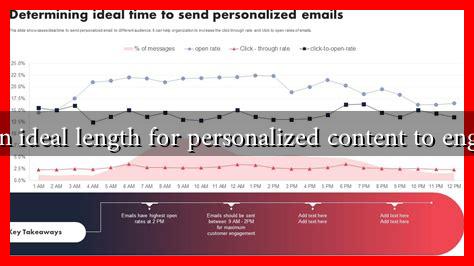-
Table of Contents
Is There an Ideal Length for Personalized Content to Engage Users?
In the digital age, personalized content has become a cornerstone of effective marketing strategies. However, one question that often arises is: what is the ideal length for this content to truly engage users? The answer is not straightforward, as it depends on various factors, including the platform, audience, and type of content. This article delves into the nuances of content length and its impact on user engagement.
The Importance of Personalization
Before exploring content length, it’s essential to understand why personalization matters. Personalized content can significantly enhance user experience and engagement. According to a study by Epsilon, 80% of consumers are more likely to make a purchase when brands offer personalized experiences. This statistic underscores the importance of tailoring content to meet the specific needs and preferences of users.
Understanding Content Length
Content length can vary widely depending on the medium. Here are some general guidelines for different types of content:
- Blog Posts: Research suggests that blog posts between 1,500 and 2,500 words tend to perform best in terms of SEO and user engagement. A study by HubSpot found that posts with 2,000 words or more receive more shares and backlinks.
- Social Media Posts: For platforms like Twitter, brevity is key. Tweets with fewer than 100 characters receive 17% higher engagement. In contrast, Facebook posts with 40-80 characters tend to perform better.
- Email Newsletters: The ideal length for email content is around 50-125 words. According to a study by Boomerang, emails of this length have a higher response rate.
- Video Content: For platforms like YouTube, videos that are between 7-15 minutes long tend to retain viewers better, while shorter videos (under 2 minutes) are more effective for quick engagement.
Factors Influencing Ideal Length
While the above guidelines provide a framework, several factors can influence the ideal length for personalized content:
- Audience Preferences: Understanding your audience is crucial. Conduct surveys or analyze engagement metrics to determine what length resonates best with your users.
- Content Type: Different types of content serve different purposes. For instance, a detailed how-to guide may require more length than a quick promotional post.
- Platform Characteristics: Each platform has its own norms and user expectations. Tailoring content length to fit these characteristics can enhance engagement.
- Call to Action (CTA): The length of your content may also depend on the strength and clarity of your CTA. A compelling CTA can encourage users to engage further, regardless of content length.
Case Studies and Examples
Several brands have successfully leveraged personalized content to boost engagement through optimal length:
- BuzzFeed: Known for its listicles, BuzzFeed often uses content that ranges from 1,000 to 2,000 words, effectively engaging users with a mix of visuals and text.
- Mailchimp: Their email campaigns typically feature concise content (around 100 words) that drives high engagement rates, demonstrating the effectiveness of brevity in email marketing.
- Buffer: Buffer’s blog posts often exceed 1,500 words, providing in-depth insights that cater to their audience’s desire for comprehensive information.
Conclusion
In conclusion, while there is no one-size-fits-all answer to the ideal length for personalized content, understanding your audience and the context in which they consume content is key. By considering factors such as platform characteristics, content type, and audience preferences, marketers can tailor their content length to maximize engagement. Ultimately, the goal should be to provide value, whether through a brief social media post or an in-depth blog article. As the digital landscape continues to evolve, staying attuned to user behavior and preferences will be essential for crafting effective personalized content.
For further reading on content marketing strategies, check out Content Marketing Institute.

